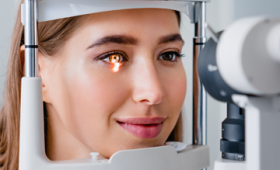What Are The Main Methods For Myopia Treatment?
The main methods used in myopia treatment fall into three categories: Traditional correction methods like glasses and contact lenses, laser surgery (LASIK, PRK, SMILE) aiming to eliminate myopia entirely, and implantable collamer lens (ICL) implantation, which is suitable for high degrees of myopia. Each of these methods has its own advantages, risks, and costs. The choice of treatment should be determined after a comprehensive eye examination, based on the person’s life expectations and anatomical features such as corneal thickness. Thanks to modern technologies, myopia treatment is now much safer and more effective. Laser surgery for myopia treatment is applied in Turkey with high success rates.
Does Laser Treatment Permanently Eliminate Myopia?
Yes, laser treatment (such as LASIK or PRK) aims to eliminate myopia by permanently changing the shape of the cornea. The laser allows the cornea to take a flatter shape, enabling the light to focus correctly on the retina. This procedure is a one-time process and generally provides a permanent correction lasting many years. However, in very rare cases, a small regression in the degree of myopia may occur. If regression occurs, an additional correction (enhancement) procedure can usually be performed if there is adequate corneal thickness. Laser surgery is performed in Turkey with high success rates in myopia treatment.
Who Is The Most Suitable Candidate For Laser Surgery?
The most suitable candidates for laser surgery are generally individuals who are over 18 years old, whose glasses prescription has not significantly changed in the last year (stable myopia), who have sufficient corneal thickness, and who do not have other serious eye diseases (uncontrolled diabetic retinopathy, glaucoma, etc.). Furthermore, it is essential that the person’s expectations from the surgery are realistic and that they can strictly adhere to post-operative instructions. Candidacy must be finalized with a comprehensive pre-operative examination. Modern centres in Turkey perform this pre-assessment using the latest technology devices.
Can High Degrees Of Myopia Be Treated With Laser?
High degrees of myopia (e.g., -8.00 or higher) are generally not suitable for standard LASIK because too much tissue would need to be removed from the cornea. In this case, two main alternatives stand out: Surface ablation methods like PRK/LASEK or the most common, implantable collamer lens (ICL) implantation. ICL preserves corneal tissue by placing an additional lens inside the eye without touching the natural lens, making it the safest and most effective solution for high-degree myopia. ICL treatment is a frequently preferred solution for high-degree myopia in Turkey.
What Is The Main Difference Between LASIK And PRK?
The main difference between LASIK and PRK/LASEK is the method of accessing the cornea. In LASIK, a flap is created on the surface of the cornea, the laser reshapes the tissue under this flap, and the flap is closed back into place. In PRK, no flap is created; the outermost layer of the cornea (epithelium) is gently removed, and the laser is applied directly to the surface. LASIK offers faster recovery, while PRK is considered safer for those with thinner corneas or working in high-risk professions. Both methods are successfully applied in Turkey.
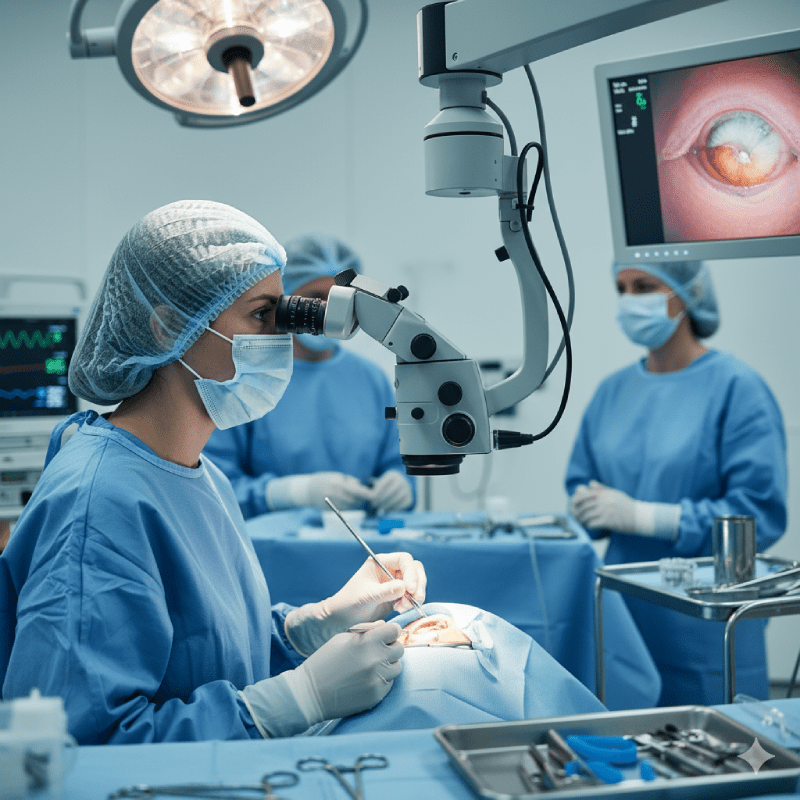
How Long Is The Recovery Period After Laser Treatment?
The recovery period varies depending on the laser technique applied. With LASIK, vision clarity generally improves significantly within 24 to 48 hours, and the patient can return to work within a few days. However, in PRK/LASEK, recovery is slower as the epithelial layer of the cornea needs to regenerate; full clarity may take several weeks, but a return to daily activities is usually possible within a week. Adhering to doctor’s instructions in Turkey during the recovery process is critically important.
What Is An Implantable Collamer Lens (ICL) And How Does It Work?
The Implantable Collamer Lens (ICL) is a treatment method designed specifically for patients who are not suitable for laser surgery due to high myopia or thin corneas. The ICL works like a soft and flexible contact lens placed between the iris and the natural lens, without touching the eye’s natural lens. The ICL provides clear vision by focusing light perfectly onto the retina and has the unique feature of being removable from the eye if necessary. This reversibility makes it unique and is applied with high patient satisfaction in Turkey.
Does Wearing Glasses Stop The Progression Of Myopia?
No, standard spectacle lenses do not stop the progression of myopia; they only correct the current refractive error to provide clear vision. However, there are special methods available, such as spectacle lenses designed to slow down myopia progression in children (peripheral defocus lenses) or low-dose atropine drops. Myopia progression usually stops during adolescence, and glasses only help with clear sight during this period. Controlling progression is an important part of myopia treatment.
What Alternative Do Contact Lenses Offer To Myopia Treatment?
Contact lenses offer a more aesthetic and practical alternative to glasses for myopia treatment. Since the lenses sit directly on the corneal surface, they provide a more natural field of view and less image distortion. However, lens use requires daily hygiene and care, and improper use can increase the risk of eye infection. Lenses are not a permanent treatment; they are only temporary tools that correct vision. Those seeking a permanent solution should consider surgical treatments in Turkey.
What Is The Age Limit For Myopia Treatment?
Generally, the age limit of 18 is accepted for myopia treatment. This is the period when the eye prescription and eye anatomy begin to stabilize. Even after the age of 18, the prescription should be stable for at least one year before deciding on laser surgery. The age limit for ICL surgeries may be more flexible, but the completion of eye development is still the main requirement. Detailed age and stability assessment is performed before treatment in Turkey.
What Problems Does Untreated Myopia Cause?
Untreated or inadequately corrected myopia does not only cause blurred vision; it also seriously degrades a person’s quality of life and increases the risk of accidents. In high degrees of myopia, the risk of developing more serious eye diseases such as retinal detachment, glaucoma, and cataracts increases due to the elongation of the eye structure. Therefore, timely and appropriate correction of myopia is vital. Expert centres for myopia treatment are available in Turkey.
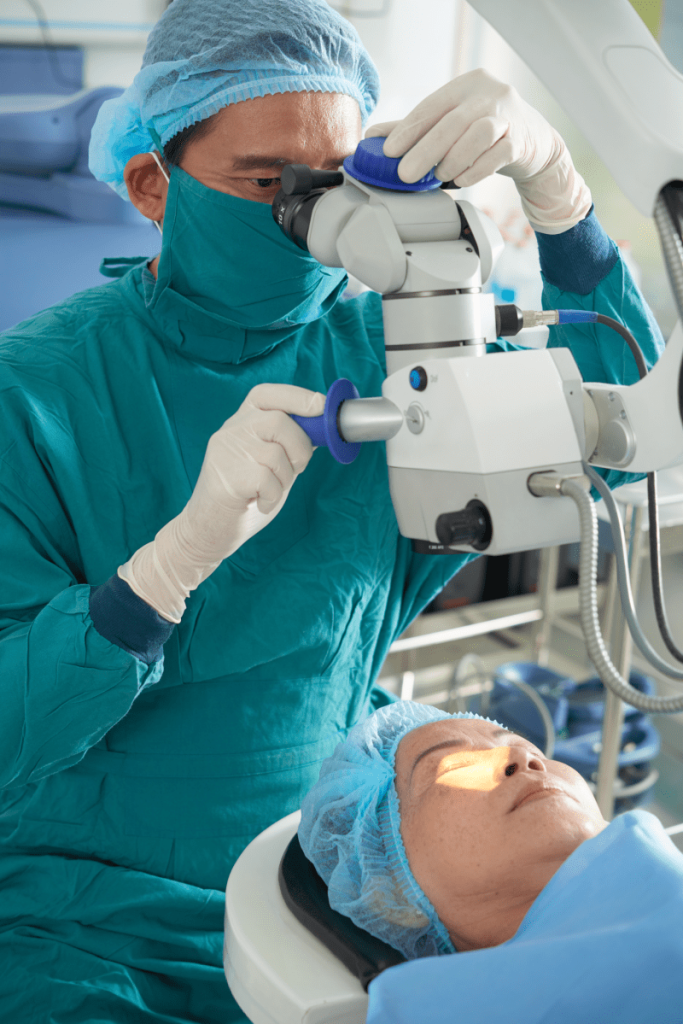
Does Myopia Return After Laser Surgery?
The complete return of myopia is rare after laser surgery, but a small amount of prescription may return (regression), especially in patients with high myopia or those operated on at a young age. This regression is usually seen within the first 6 months to 1 year. This condition, which depends on the eye’s healing response, can generally be corrected with an additional laser treatment if the remaining corneal tissue is sufficient. These types of correction procedures can be successfully performed in Turkey.
What Factors Affect The Cost Of Myopia Treatment?
The main factors affecting the cost of myopia treatment include the type of surgical procedure applied (LASIK, Femto-LASIK, SMILE, ICL), the up-to-dateness of the technology used (e.g., latest generation laser devices), the location and experience of the centre, and the services included in the surgical package (pre-examination, medications, control sessions). Centres in Turkey offering the highest technology and most comprehensive services adopt a corresponding pricing structure. Treatment options in Turkey are generally more economical than in Europe.
Is Pain Felt During Laser Surgery?
No pain is felt during laser surgery (especially LASIK). Anaesthetic eye drops are used before the procedure to completely numb the eye surface. Patients usually only feel the slight pressure of an instrument used to keep the eyelid open or hear a slight clicking sound during the laser application. After PRK, there might be slight stinging and watering for the first few days, but this is controlled with prescribed painkillers. You can choose Turkey for comfortable treatment options.
What Advantages Does The SMILE Method Offer In Myopia Treatment?
The SMILE (Small Incision Lenticule Extraction) method offers significant advantages over traditional LASIK in myopia treatment. In this method, a very small incision (2-4 mm) is made in the cornea, meaning no flap is created. The absence of a flap reduces the risk of dry eye and flap dislocation. SMILE is a preferred technique in Turkey because it provides a more stable corneal structure, especially for patients with high myopia and those who engage in active sports.
What Should Contact Lens Users Do Before Laser Surgery?
Contact lens users must stop wearing lenses for a period before laser surgery. Lenses can temporarily change the natural shape of the cornea. Generally, it is advised to stop wearing soft lenses for 1 week and hard (gas permeable) lenses for 3-4 weeks beforehand. This period is essential for the cornea to return to its true shape and for accurate measurements to be taken. Clinics in Turkey will explain this process step-by-step.
What Happens If Laser Surgery Fails?
The complete failure of laser surgery is very rare. The situation generally encountered is less correction than expected (regression) or residual prescription remaining in the eye. In this case, if the corneal thickness is adequate, a second correction procedure (enhancement) can be performed. If the cornea is not suitable or the prescription is too high, ICL implantation can be considered as a permanent alternative solution. You can get support from experts in Turkey for all these options.
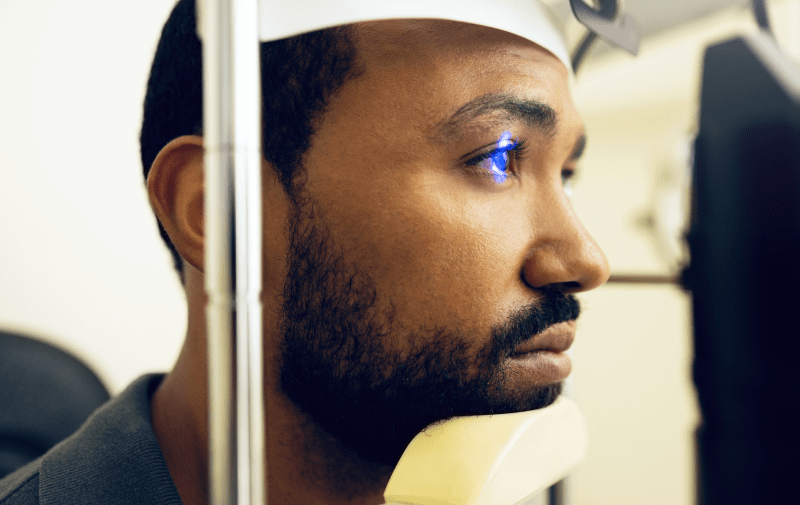
Are Implantable Collamer Lenses (ICL) A Permanent Solution?
Implantable Collamer Lenses (ICL) provide a permanent vision correction lasting many years for myopia. ICLs are typically designed to remain in the eye for a lifetime, and their materials are biologically compatible. However, unlike laser surgery, ICLs have the feature of being removable or replaceable if necessary. This reversibility makes ICL a safe and permanent option for high myopia patients and is frequently applied in Turkey.
Does Dry Eye Syndrome Occur After Laser Treatment?
Yes, temporary dry eye syndrome can occur after laser treatment (especially LASIK). During flap creation, the nerve endings in the cornea are temporarily cut, which reduces the eye’s tear production and surface sensitivity. This condition usually lasts for a few weeks or months and is treated with artificial tears. The SMILE method is more advantageous in reducing the risk of dry eye as it severs fewer nerves. This risk management is part of the treatment protocols in Turkey.
What Are The Latest Technological Developments In Myopia Treatment?
The latest technological developments in myopia treatment include Femto-LASIK (bladeless laser), minimally invasive SMILE surgery, and Wavefront or Topography-Guided laser systems that provide personalized treatment. Furthermore, the new generation EVO Visian ICL models can treat a wider range of prescriptions. These advanced technologies offer higher precision, faster recovery, and better night vision quality. Access to these latest technologies is quite easy in Turkey.
Is ICL Surgery Different From Laser Surgery?
Yes, ICL surgery is fundamentally different from laser surgery. While the laser reshapes the outer surface of the cornea, ICL surgery involves implanting a lens inside the eye. The ICL is placed behind the iris without touching the eye’s natural lens. ICL is suitable for patients with inadequate corneal tissue or high myopia and is generally seen as an alternative to the laser. Centres in Turkey offer both methods.
Can Astigmatism Be Treated At The Same Time?
Yes, astigmatism (cylindrical prescription) can be corrected simultaneously and in a single surgical procedure with myopia treatment. Laser methods like LASIK and PRK can correct the curved structure of the cornea, treating both myopia and astigmatism simultaneously. For patients with high astigmatism, toric ICLs used in ICL surgery also offer simultaneous correction, providing a comprehensive solution. Combined corrections are standard in treatments in Turkey.
What Tests Are Performed Before Laser Surgery?
A series of detailed tests are performed before laser surgery. The most important ones are: Measurement of corneal thickness and mapping (topography), precise measurement of the eye prescription (with and without drops), measurement of eye pressure, examination of the retina and optic nerve, and dry eye tests. These tests are vital for determining the patient’s suitability for surgery, the type of laser to be used, and potential risks. Modern clinics in Turkey may offer these tests in a complimentary pre-assessment package.
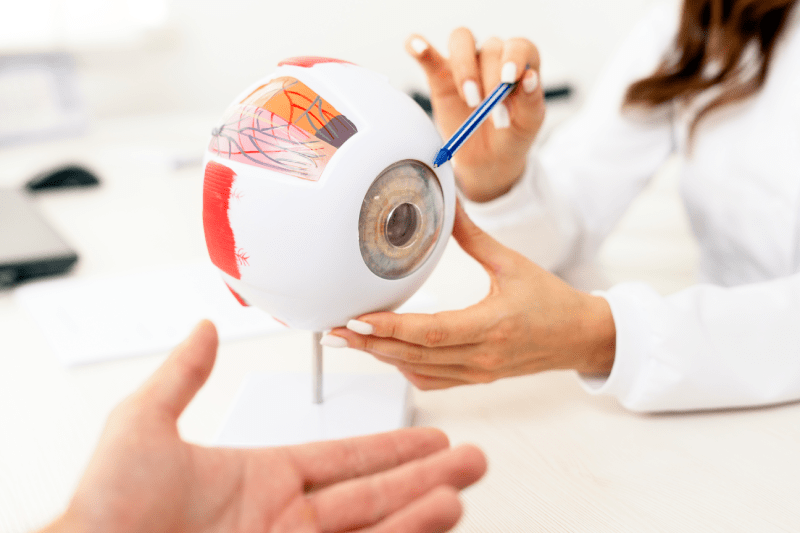
Can Contact Lenses Be Used At Night For Myopia Treatment?
Yes, special contact lenses used in myopia treatment can be worn while sleeping using a method called Orthokeratology (Ortho-K). Ortho-K lenses temporarily flatten the shape of the cornea during sleep. When the lens is removed in the morning, this correction lasts throughout the day, and the person can see clearly without lenses. This method is an effective alternative, especially for children and adolescents who want to control the progression of myopia. This treatment is also available in Turkey.
When Can Sports Activities Be Resumed After Laser Treatment?
The time to resume sports activities after laser treatment depends on the procedure performed and the type of sport. After LASIK, light sports (walking) can be resumed after a few days. However, for contact sports (basketball, soccer) that carry a risk of eye trauma, it is generally advised to wait at least 1 month. After PRK, a longer break of several weeks may be necessary due to slower healing. You should discuss your post-treatment sports plan with your surgeon in Turkey.
How Does Pregnancy Affect Myopia Treatment?
Pregnancy is a period where eye prescription can temporarily change due to hormonal shifts. Therefore, laser surgery or ICL implantation is not recommended for myopia during pregnancy and breastfeeding. To proceed with treatment, one should wait a few months after birth and the end of the breastfeeding period for the eye prescription to stabilize. Prescription stability is a prerequisite for successful myopia treatment.
Can Presbyopia And Myopia Be Treated Simultaneously?
Yes, age-related near vision loss (presbyopia) and myopia can be treated simultaneously with special methods. In laser, this is achieved with the Monovision technique (one eye set for distance, the other for near) or by using special laser profiles like PresbyLASIK. In ICL treatment, new-generation trifocal or ED-ICL lenses can be used to solve both distance and near vision problems simultaneously. These advanced combined treatments are successfully applied in Turkey.
Can Cataracts Occur After ICL Implantation?
Yes, cataracts can occur after Implantable Collamer Lens (ICL) implantation. The ICL is placed without touching the eye’s natural lens. Over the years (usually after age 60), the person’s own natural lens may become opaque, causing a cataract. If a cataract develops, the ICL is removed, and a permanent Intraocular Lens used in cataract surgery is implanted in place of the cataractous natural lens. Intervention for cataract development can be easily done in Turkey.
Does Night Vision Quality Decrease After Laser Surgery?
After some laser surgeries, especially in older technology or when very high prescriptions are corrected, a temporary decrease in night vision quality or problems with glare/halos (seeing rings or halos around lights) may occur. Modern, personalized Wavefront or Topography-Guided laser treatments have significantly reduced this risk. Generally, these side effects diminish over time. Laser technologies used in Turkey are designed to minimize such side effects.
Can Treatment Be Done While Myopia Is Progressing?
It is not recommended to perform laser surgery or ICL implantation while myopia progression continues (when it is not stable). The purpose of the surgery is to correct the current prescription; if the prescription continues to progress, the effect of the surgery will quickly be lost. Progression must be controlled (with special lenses in children), and in adults, stability must be awaited for at least one year. Prescription stability is a priority for all experts in Turkey for treatment.
Up To What Degree Is Laser Surgery Effective?
Laser surgery (LASIK/PRK) is generally effective for myopia up to -10.00 diopters. However, this upper limit depends on the person’s corneal thickness and anatomy. It is mandatory to preserve a certain thickness of the cornea (residual stromal bed) for a safe surgery. For myopia higher than -10.00 diopters or in thin corneas, ICL treatment is a safer and more effective alternative. These limits are meticulously determined in Turkey.
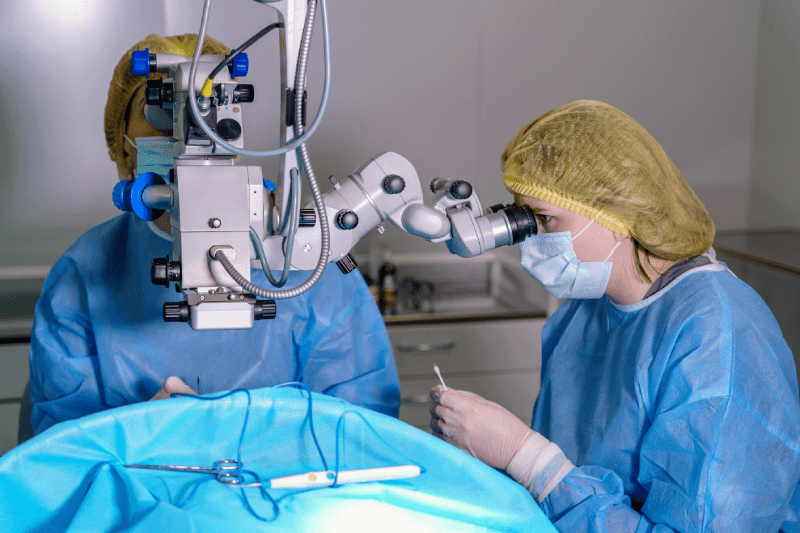
Are Other Glasses Needed After Laser Treatment?
The vast majority of patients achieve clear vision without glasses after laser treatment. However, if age-related near vision loss (presbyopia) occurs, which everyone experiences after the age of 40, reading glasses may be needed to see clearly up close. Unless the Monovision technique was applied, the need for reading glasses for presbyopia will become inevitable. This aging process is independent of laser treatment.
Is Medication Used In Myopia Treatment?
Medication use in myopia treatment is generally applied to children to slow down the progression of myopia (myopia control). The most commonly used medication is low-concentration atropine eye drops. These drops help slow down myopia progression by slightly dilating the pupil and affecting the eye’s focusing mechanism. This treatment does not provide permanent correction but merely curbs progression. Progression-stopping treatments are becoming widespread in children in Turkey.
Does Eye Pressure Increase After Laser Surgery?
Temporary elevation of intraocular pressure (IOP) may occur after laser surgery. This condition is usually related to the steroid eye drops used after the surgery and returns to normal when the drops are discontinued or changed. Additionally, corneal thinning in LASIK can falsely lower tension readings, so post-laser IOP monitoring requires special attention. Post-treatment pressure monitoring is important in Turkey.
How Is Night Vision Affected After ICL Surgery?
Night vision after ICL implantation is generally better and more stable than after laser treatment. Since ICLs do not disturb the natural structure of the cornea, the halo or glare effects seen with the laser are less common. New-generation ICLs are designed to provide excellent contrast sensitivity, especially in low light conditions. Therefore, ICL offers an advantage in Turkey for patients who drive at night.
How Long Must One Refrain From Driving After Laser Treatment?
The duration one must refrain from driving after laser treatment depends on how quickly visual clarity returns. After LASIK, most people can drive within 24 to 48 hours after a day of rest, reaching legal driving limits. However, full recovery of night vision may take slightly longer. A longer waiting period of several weeks may be necessary for PRK. Your surgeon in Turkey will provide specific recommendations.
What Should Be Considered To Prevent Myopia Progression?
What should be considered to control myopia progression, especially in children: Increasing the time spent outdoors in sunlight (at least 2 hours a day), taking frequent breaks during close work (20-20-20 rule), limiting screen time, and maintaining a proper reading distance. These preventive measures are important in reducing the speed of progression. Preventing progression is a critical phase of myopia treatment.
What Alternatives Should Those Unsuitable For Laser Treatment Pursue?
Patients unsuitable for laser treatment (thin cornea, very high myopia, etc.) should generally pursue two main alternatives: Implantable Collamer Lens (ICL) implantation (a permanent solution that protects the cornea) or the use of glasses/contact lenses. ICL is the safest surgical option that provides the best vision quality for high prescriptions. Experts in Turkey recommend the ICL method for patients in this situation.
What Is The Expertise Level For Myopia Treatment In Turkey?
Turkey has internationally recognized centres of expertise that provide myopia treatment with international standards and the latest technology equipment. Advanced surgical methods such as Femto-LASIK, SMILE, and ICL are applied with high success rates. Experienced surgeons and competitive prices in Turkey have made the country a global health tourism destination. Getting treatment in Turkey combines quality and affordability.
Why Should Turkey Be Preferred For Myopia Treatment?
Turkey should be preferred for myopia treatment because it combines high-quality health services with affordable costs. Patients access the same modern laser devices as clinics in Europe and the US while significantly saving on overall expenses. Additionally, clinics in Turkey offer comprehensive service packages tailored for international patients, such as fast appointments, accommodation, and interpretation services. Therefore, Turkey is one of the most attractive options for myopia treatment.
For Your Clear Vision Journey, Contact Cure Holiday
Choosing the right method for myopia treatment is not just about getting rid of your glasses; it is a critical decision for your long-term eye health. Finding the most suitable option among laser, ICL, and other treatment options requires expert guidance.
Cure Holiday will connect you with experienced surgeons and centres in Turkey that adhere to the highest standards in the field of myopia treatment. Contact Cure Holiday immediately to create your personalized treatment plan, manage the process transparently, and achieve the best results in the safest way, and start your myopia treatment in Turkey.


